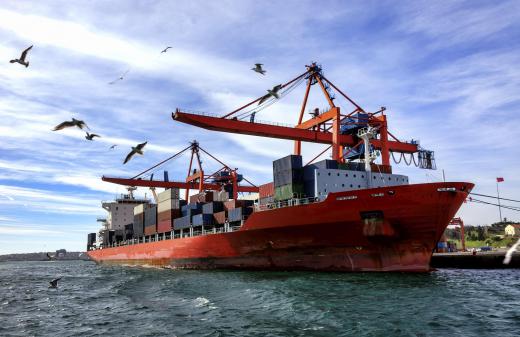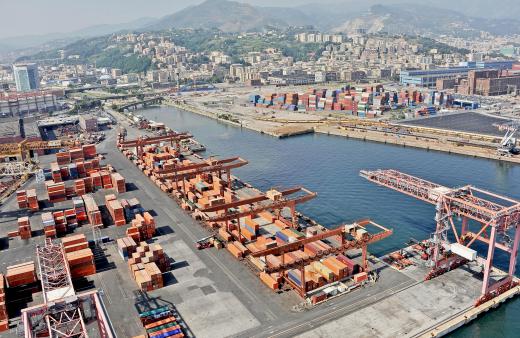A container crane is a very large hoisting device used to lift shipping containers. These cranes can be used to load or unload containers from a ship, or simply move them around a port or yard. Container cranes serve as a type of gantry crane, which is a form of crane with a hoist that travels along an overhead beam. Compared to smaller construction cranes, a container crane is generally stationary, or fixed in a single, permanent location. These machines are extremely large and powerful, and typically require extensive training and care to ensure they are operated safely.
Depending on where it will be used, a container crane may feature several designs and profiles. Full-gantry units straddle a canal or water body, and hoist containers as the ship is positioned below. Half-gantry units are much more common, and extend over the edge of water in a deep harbor or port. High profile units feature a hinged arm that can lift containers up and over the ship and onto the shoe. Low-profile units swing out to move these containers without lifting them to extreme elevations.

Each container crane features a steel frame with a hoist mechanism installed along an overhead beam. The hoist travels back and forth along the beam as needed to access containers in different parts of the ship or yard. A spreader device hangs from the hoist using steel cables. This spreader features hooking mechanisms that lock onto each corner of the container to hold it securely as it's moved. Many containers include integral corner castings, or cut-outs designed to accept the hooks on a standard spreader.

A container crane may rely on several operating systems to provide the power and strength needed to lift these containers. Some utilize a hydraulic lifting mechanism, while others use an electric or hybrid engine. Each crane may rely on a diesel fuel generator or electricity from the shore to supply power to its engine.
The operator of a container crane sits in a special operating cab positioned above the hoist. This cab can typically travel along the length of the beam so that the operator can easily position the spreader and lift or lower containers. Many regions require these operators to undergo training and certification to ensure they are able to operate the crane. This teaches the operator not only how to control the crane to maximize safety, but also how to inspect the crane for defects prior to each use.
